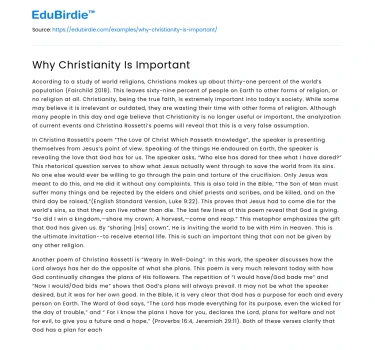According to a study of world religions, Christians makes up about thirty-one percent of the world’s population (Fairchild 2018). This leaves sixty-nine percent of people on Earth to other forms of religion, or no religion at all. Christianity, being the true faith, is extremely important into today’s society. While some may believe it is irrelevant or outdated, they are wasting their time with other forms of religion. Although many people in this day and age believe that Christianity is no longer useful or important, the analyzation of current events and Christina Rossetti’s poems will reveal that this is a very false assumption.
In Christina Rossetti’s poem “The Love Of Christ Which Passeth Knowledge”, the speaker is presenting themselves from Jesus’s point of view. Speaking of the things He endoured on Earth, the speaker is revealing the love that God has for us. The speaker asks, “Who else has dared for thee what I have dared?” This rhetorical question serves to show what Jesus actually went through to save the world from its sins. No one else would ever be willing to go through the pain and torture of the crucifixion. Only Jesus was meant to do this, and He did it without any complaints. This is also told in the Bible, “The Son of Man must suffer many things and be rejected by the elders and chief priests and scribes, and be killed, and on the third day be raised,”(English Standard Version, Luke 9:22). This proves that Jesus had to come die for the world’s sins, so that they can live rather than die. The last few lines of this poem reveal that God is giving. “So did I win a kingdom,—share my crown; A harvest,—come and reap.” This metaphor emphasizes the gift that God has given us. By “sharing [His] crown”, He is inviting the world to be with Him in Heaven. This is the ultimate invitation--to receive eternal life. This is such an important thing that can not be given by any other religion.
Save your time!
We can take care of your essay
- Proper editing and formatting
- Free revision, title page, and bibliography
- Flexible prices and money-back guarantee
Another poem of Christina Rossetti is “Weary in Well-Doing”. In this work, the speaker discusses how the Lord always has her do the opposite of what she plans. This poem is very much relevant today with how God continually changes the plans of His followers. The repetition of “I would have/God bade me” and “Now I would/God bids me” shows that God’s plans will always prevail. It may not be what the speaker desired, but it was for her own good. In the Bible, it is very clear that God has a purpose for each and every person on Earth. The Word of God says, “The Lord has made everything for its purpose, even the wicked for the day of trouble,” and “ For I know the plans I have for you, declares the Lord, plans for welfare and not for evil, to give you a future and a hope,” (Proverbs 16:4, Jeremiah 29:11). Both of these verses clarify that God has a plan for each person, and it is the person’s choice whether they will fulfill it or not.






 Stuck on your essay?
Stuck on your essay?

